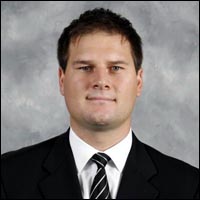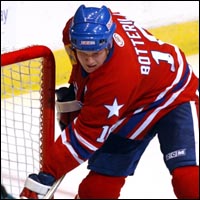by Brian Coe || AHL On The Beat Archive
 If you were around the Wilkes-Barre/Scranton Penguins for the 2001 Calder Cup Finals, you might remember Jason Botterill suiting up for the Saint John Flames. He certainly remembers his time playing in Wilkes-Barre.
If you were around the Wilkes-Barre/Scranton Penguins for the 2001 Calder Cup Finals, you might remember Jason Botterill suiting up for the Saint John Flames. He certainly remembers his time playing in Wilkes-Barre.
"I had some great experiences, and one of them was obviously playing in Saint John in 2001 and being able to win the Calder Cup," he said.
"Playing in Wilkes-Barre in the Finals, it was an excellent atmosphere. I remember coming out for warm ups in Game Three and the entire building was already filled, everyone dressed in white. Just an atmosphere that you rarely see in the minors and I know it was a memory I still talk to my former teammates in Saint John about."
And while Botterill was on the wrong side of the equation back in 2001, he is currently playing a big part in determining the success of the Penguins.
A veteran of 270 AHL games with Saint John and Rochester as well as 88 National Hockey League games with Dallas, Calgary, Atlanta and Buffalo, Botterill currently serves as the director of hockey administration for the Pittsburgh Penguins. In his current capacity, he deals with issues concerning the collective bargaining agreement, salary cap compliance and contract negotiations.
A ‘dumb jock,’ he is not.
Forced to retire due to concussion problems in 2004, Botterill went back to his alma mater, the University of Michigan, where he earned an MBA.
"I was fortunate to play pro hockey for eight years," he said. "I went back to school thinking I had always enjoyed the quantitative theory and I probably would be going into commercial banking or corporate finances.
"After my first year I realized I was watching SportsCenter more than watching CNBC. I realized it was still a passion of mine – the game of hockey – and this was a way to sort of stay a part of it and be part of a job I really enjoyed."
So instead of heading to Wall Street, Botterill made his way over to the NHL offices in New York City, where he interned with the league’s central registry department.
"The job was … to answer any questions general managers or teams had [about the new collective bargaining agreement]," he said. "And also, my big thing was to work with law firms on salary arbitration. So I got a good sense and feel of how salary works and the market for free agency in our industry."
Botterill’s background put him in a unique, and somewhat uncomfortable, situation during that season at the league’s main offices.
Arbitration hearings entail a lot of back and forth between players and teams, with each side arguing its case for a higher or lower salary, respectively. Botterill’s position meant that he would be arguing against raises for some of the very players he called teammates just a
few months prior.
 "That first year, I believe there was something like 13 Buffalo Sabres that filed for arbitration. And coming from that organization just the year before, looking across the table at Danny Briere and J.P. Dumont, it was not an easy feeling," he said. "But thankfully they are such
"That first year, I believe there was something like 13 Buffalo Sabres that filed for arbitration. And coming from that organization just the year before, looking across the table at Danny Briere and J.P. Dumont, it was not an easy feeling," he said. "But thankfully they are such
great guys…and they understood it was a great opportunity for me to further my career.
"But I definitely take harassment from my friends up in the National Hockey League because they all thought I was a spy for the NHLPA. And all my PA friends, they all think I am a scavenger working for the other side, the dark side now."
Botterill is being kept plenty busy in Pittsburgh these days. With a young roster that includes world-class talents like Sidney Crosby, Ryan Whitney, Evgeni Malkin and Marc-Andre Fleury, the Penguins could see some big paychecks being handed out in the near future. It’s part of
Botterill’s job to determine just how large those checks should be.
"The biggest thing for me, in Pittsburgh, is just evaluations and budgeting for future years," he explained. "There is a lot of young talent up there and Pittsburgh is just making sure we can keep all these young players under the salary cap. As your players have success, as your younger players move up, you just can’t keep them all. When you have star players such as Crosby, Malkin, [Jordan] Stall, it’s going to be hard keeping them all under contract. But somehow we have to find a way."
Botterill believes the issues a salary cap presents puts an even bigger importance on home-grown players. Hence, AHL teams like Wilkes-Barre/Scranton take on an even bigger role in the success of NHL clubs.
"The days of big market teams – going out there, signing all the free agents and, if they make a mistake, finding more money for more players – is gone," he stated. You have to have a system where you make a commitment to certain playepenrs, and then you have to build from within your organization.
"That’s what I like so much about our organization. Having [director of player development] Tom Fitzgerald, having great coaches out here such as Todd [Richards] and Dan [Bylsma], working with young players. Because if you don’t have young players in the system, it is going to be impossible [to build a winning team]. The days of going out in the free agent market are gone. Yeah, Philadelphia and New York, some of the big-market teams, did that this past summer. But the cap dollars are gone now, and they can’t do that year after year."
It was virtually a no-brainer to give Sidney Crosby a contract extension this past offseason. When you win the league MVP award and the scoring title in just your second year, you can basically set your own price.
But Botterill doesn’t have a crystal ball. That’s why talent evaluation plays a big part in his job as well.
"The biggest thing is not just knowing how a player is performing this year," he said. "It is what is projected in two, three, four years down the road.
"The big thing nowadays is for teams to lock up core players, for a significant amount of time. We have done that with Sidney, we have done that with Ryan Whitney."
It’s that second tier of players, not the superstars, that require a good look from management’s side.
"Coaches have to be on the same page as the scouts, and scouts have to be on the same page as the management if we are going to make a long term investment in a player," Botterill said. "It’s sometimes nerve-racking, and a nerve-racking process to make because you are giving a lot of dollars to some of these players. But I think because there is a lot of discussion about these players throughout the organization, we are going to have some success here."





































